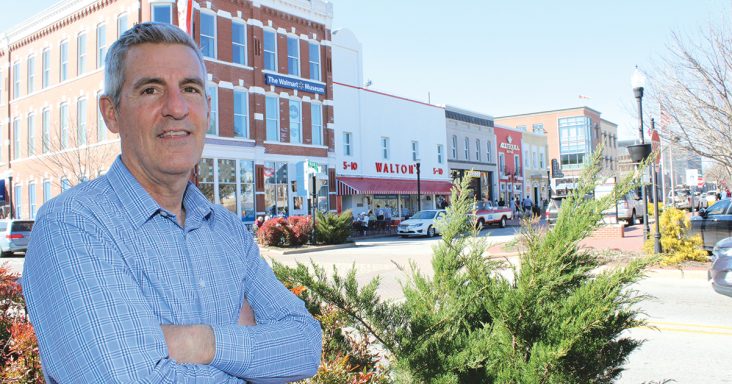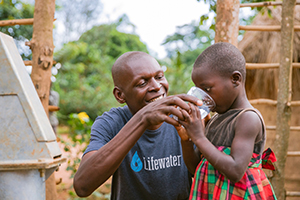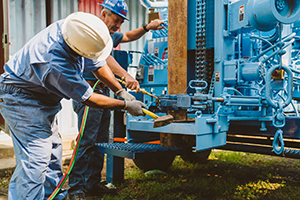Bentonville nonprofit creates lasting change with clean water
by March 31, 2022 12:17 pm 1,863 views

David LeVan, CEO of LIfewater International.
Every two minutes, a child under 5 will die somewhere in the world simply because they didn’t have clean water. Lifewater International, a Christian clean water nonprofit headquartered in Bentonville, is working to change that.
For years, Prossy, a single mother of six in Uganda, worried about her children. Using water from a dirty, stagnant pond for drinking, cooking and cleaning, her family’s clothes were never clean, their food was brown, and her children were continually sick with waterborne diseases.
Since Lifewater International dug a well for her village, Prossy can care for her family, and her children are healthy. Having fresh water also enabled her to expand her brick-making business.
“Since the water came to our village, there has been so much development because people don’t spend their time in clinics and hospitals. They’re now able to work more,” Prossy said via video.
One in 10 people on the planet, or 771 million, lack basic access to safe water, meaning they can’t get to safe water and back home in 30 minutes. One in four people lacks access to a toilet, critical to overall health.
The water crisis becomes an economic crisis when people in rural areas must spend time walking miles to gather water every day or spend their income treating waterborne diseases instead of running a business or investing in education. Access to safe water helps the economy long term. According to Lifewater, every $1 invested in safe water and sanitation yields a $5 to $28 return in increased economic activity and reduced healthcare costs.
GRASSROOTS APPROACH
Lifewater International works to end the global water and sanitation crisis in rural parts of the world. With a $65 donation, Lifewater can give one person water for life.
Founded in 1977 in California, Lifewater uses a sustainable, community development approach in rural, hard-to-reach areas in Ethiopia, Uganda, Tanzania, and Cambodia. Lifewater’s grassroots method, ‘Vision of a Healthy Village,’ works in regions of the world with the most significant water needs, using local staff within those countries to organize projects in districts for seven to 10 years, said David LeVan, Lifewater CEO. Data-driven, the organization keeps detailed records throughout the process.

For the first three years, Lifewater’s field team lives in the village, going house by house helping families adopt sanitation and hygiene practices. They include handwashing with soap, learning how to safely store water, creating a drying rack for dishes away from animals, building and using a latrine and keeping homes clear of trash and feces. The team works with local schools to add enough toilets for students and teach health education. Local churches ensure the community’s most vulnerable are taken care of. LeVan said the village must partner with Lifewater for the changes to be sustainable.
“When we go into a community, often the biggest problem is open defecation,” he said. “So part of our work is helping them see their need for changing behaviors because you can bring clean, safe water into an environment, but if [open defecation] is happening, it’s polluted right away,” he said. Once each home has a functioning restroom, the local government verifies the community as Open Defecation Free (ODF), a significant health milestone.
At that point, Lifewater engineers assess the village’s water needs and construct or rehabilitate a water source like a well or capped spring. The community elects a water committee to supervise and contributes up to 15% of the water source’s cost. Lifewater monitors the water point and ODF status for five years after completion.
 “That’s what I love about our approach. We go into a village to solve a problem together. We’re not there to solve it for them,” said Jim Evans, regional director of donor relations. “Once somebody’s there to teach them, they not only embrace it, but they own it. You hear of communities coming together to build 8 kilometers of road by hand so our truck can get back to their village to drill a well, or villages digging 30 kilometers of trenches to lay pipe for water. The amount of work they accomplish boggles my mind.”
“That’s what I love about our approach. We go into a village to solve a problem together. We’re not there to solve it for them,” said Jim Evans, regional director of donor relations. “Once somebody’s there to teach them, they not only embrace it, but they own it. You hear of communities coming together to build 8 kilometers of road by hand so our truck can get back to their village to drill a well, or villages digging 30 kilometers of trenches to lay pipe for water. The amount of work they accomplish boggles my mind.”
Since 2016, Lifewater has served 344,000 people, intending to help 575,000 by the end of 2024.
From its inception, Lifewater has met both spiritual and physical needs. “Our vision is, ‘Safe water for every child. A healthy home for every family. The love of Christ for all.” LeVan said, stressing that the organization serves all people, regardless of religion.
“It’s not us throwing on our capes to go rescue them from their poverty. For us, as believers in Christ, it’s not our role to convert people. It’s our role to live like Christ and bring the love of Christ and the Gospel and be clear about why we’re doing it.
“For the people we are serving, it’s not about something they have to do to earn the water. It’s about us being faithful to what we’re called to.”
BUSINESS EXPERIENCE INVALUABLE
LeVan’s resume includes PricewaterhouseCoopers, Kraft and owning a consulting firm in Chicago for 20 years. After selling that business, he led a Walmart team through a three-year project in Bentonville. When the assignment ended in 2020, LeVan knew Lifewater was a good fit since he’d been a supporter and board member for years.
As CEO, LeVan moved Lifewater’s headquarters to Bentonville to be more centrally located and offer proximity to company headquarters and the supplier community in Northwest Arkansas.
Making the organization fully global, LeVan opened a hub in Addis Ababa, Ethiopia and shifted programs and roles from the United States to Addis Ababa. Lifewater employs about 75 people in Ethiopia, 36 in Uganda, 25 each in Cambodia and Tanzania, and 22 in the United States.
Prioritizing technology, LeVan invested in systems, like Alturex and Asana, used by Walmart.
“We’ve got to look at technologies that work across the globe,” he said. “We want to have world-class technology so we can use data from across five countries. Right now, we’re looking at a global finance system that makes procurement fewer steps, more transparent and more collaborative across five countries.

“There’s a balance of being a Christian organization and being the hands and feet of Jesus Christ and doing it in a way that’s sound from a business standpoint. We teach our staff about cash flow, donors, how wells are dug, and latrines because we want them to understand how the organization works. We’re doing them a disservice if we don’t talk about cash flow — that’s the No. 1 killer of any business of any size.”
STRATEGIC GOALS
Lifewater’s strategic goals are summarized in three words, “global, sustainable, and scalable,” LeVan said.
The organization has a 45-year proven track record of successfully getting clean water to those in need. “The model is good,” Evans said. “Now we’re laying the pipework to see how much flow we can get through it. We’re ready to scale.” Scaling includes intentionally expanding the donor base by getting their story out locally. “There are the resources here in Northwest Arkansas to transform the rural areas we work in in Ethiopia or Uganda,” Evans said. “With more resources, we could take a strategic look at what would it take to revitalize an entire country.”
Lifewater’s partnerships with donor corporations also benefit the corporations, Evans said. “Maybe it impacts their bottom line. Maybe it impacts their corporate social responsibility.”
Lifewater’s best years for donations were 2019, 2020 and 2021. Revenue grew from $6.3 million in 2020 to $8 million in 2021. 80% went to in-country programs, and 20% funded development and administration. Lifewater is top-rated by ECFA, Charity Navigator, Guidestar and Great Nonprofits.
Lifewater’s record of success is apparent, but work remains. In Cambodia, Reurng, her husband and nine children dug a pond in their yard to collect rainwater, but it’s deeply contaminated. “We know that the pond water gives us fever and diarrhea, but we have no choice,” Reurng said via video. During the dry season, the family must purchase water instead of buying food. “I have no hope,” Reurng said. “We only wish to have enough to eat every day.” Her family still waits for safe water.
